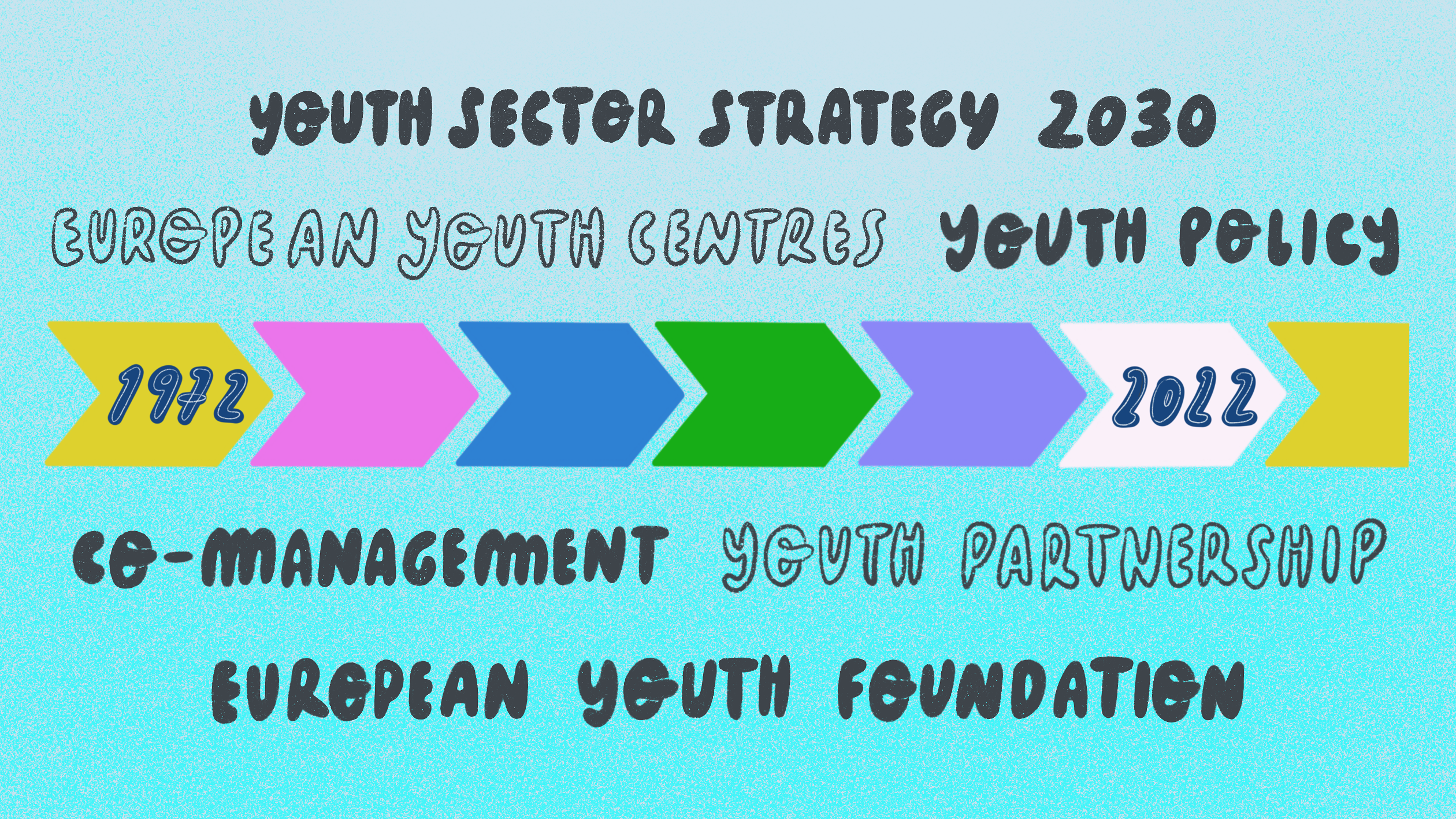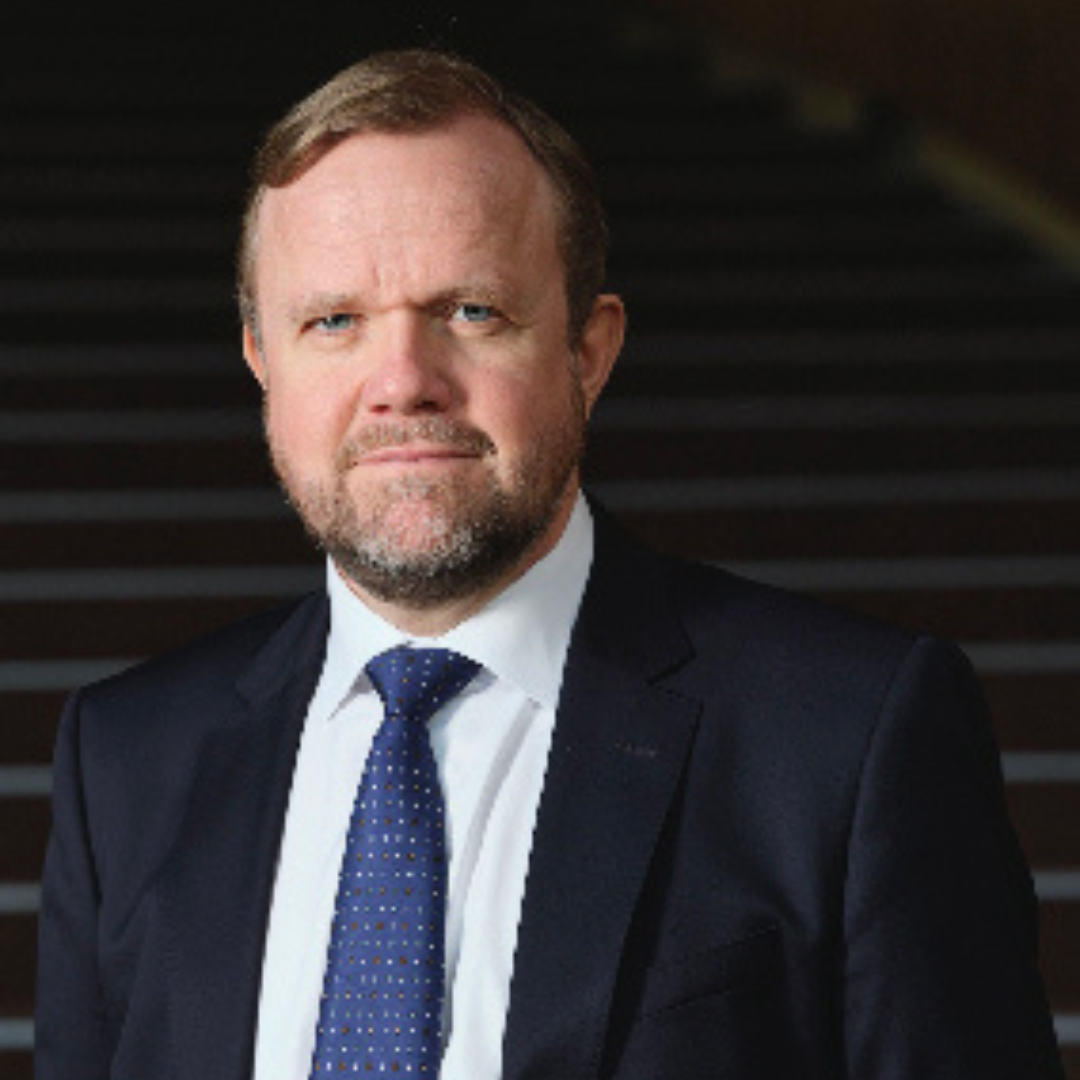
Illustration by Daniela Nunes
Interview with Bjørn Berge, Deputy Secretary General of the Council of Europe

Bjørn Berge serves as the Council of Europe’s Deputy Secretary General since 1 March 2021.
As the Deputy Secretary General he is involved in a number of key areas of the work of the Organisation, including advising and overseeing the implementation of the Secretary General’s reform agenda, in line with the decisions and priorities of the Committee of Ministers.
In its 50 years of existence, the Council of Europe’s (CoE) Youth Department has been the main driving force behind youth policy development and youth work in Europe. What would you highlight as its main achievement(s) that have supported the creation of democratic, inclusive and peaceful societies in Europe?
At the Council of Europe, we have long understood the need to involve young people in building sustainable democracies in Europe. As early as 1972, the Council of Europe set up a European Youth Centre within its own premises in Strasbourg, with the aim of bringing young people closer to Europe and its values of human rights, rule of law and democracy. Our organisation is still the only international organisation to do so. In 1972, the European Youth Foundation was also created to provide financial support for youth-led activities. The Council of Europe was also a pioneer when it comes to involving young people in decision-making, with its ground-breaking co-management system that also celebrated its 50th anniversary in 2022. After the fall of the Berlin Wall in the late 80s, a second European Youth Centre was opened in Budapest in 1995, enabling young people from the new Council of Europe member states to benefit from training and educational opportunities. Starting co-operation with the European Commission in 1998, through our joint Youth Partnership, is another important milestone in the history of the Council of Europe youth sector. Furthermore, our Organisation has helped to define and shape European youth policy by adopting a rich and comprehensive set of standards addressed to its member states, while youth-led campaigns such as "No Hate Speech", "All Different, All Equal" and the 2022 campaign "Democracy Here | Democracy Now" have seen young people at the forefront of the implementation of these standards and values of the Council of Europe.
Young people are key actors in pluralistic democracies and human rights activism. This is also recognised in the CoE Youth sector strategy 2030, which provides a policy framework and political guidance for various youth stakeholders. In what way does this Strategy complement the work of the different sectors and bodies of the Council of Europe and how is it important young people and youth organisations across our continent?
Young people are at the heart of the Youth sector strategy 2030, whose primary goal is to enable young people throughout Europe to actively support, defend, promote and benefit from the values of the Council of Europe. The Strategy itself, therefore, complements the work of other Council of Europe bodies and structures. Furthermore, the Strategy includes four strategic priorities of particular relevance to young people. These priorities are revitalising pluralistic democracy, strengthening young people's access to rights, living together in peaceful and inclusive societies and youth work. Young people play a key role in each priority: for instance, in the first priority, special emphasis is placed on increasing the capacity of youth civil society to advance participatory democracy and democratic citizenship, on enabling youth participation and creating more opportunities for young people to influence policymaking at national and international levels.
The CoE can proudly say it is a unique intergovernmental institution that has a ground-breaking and unique example of living democracy called co-management, used in the Joint Council on Youth (CMJ), that consists of governmental representatives and representatives of youth NGOs and networks. This statutory body of the CoE Committee of Ministers has been working diligently to bring about policy proposals and opinions that tackle various aspects of young people’s lives on local, national and European levels. Why is it important to have such a structure and how can the CoE bring such a mechanism closer to young people?
The co-management system of the Council of Europe is the longest established practice of youth participatory decision-making in any international organisation worldwide. The Joint Council on Youth is the place where young people are not only heard or consulted, but sit, discuss and decide together, on an equal footing, with government representatives, on youth priorities, the programme of activities and the budget. This intergovernmental committee is the example to follow when it comes to youth participation and empowerment and has been applied in a wide range of other governance and/or policy contexts.
The CoE Youth Department has played an integral part in supporting the member states to develop their youth policy, as well as building youth organisations’ capacity to improve their own services for young people across Europe. Which tools have been developed to help member states design and implement coherent and effective youth policies that promote the CoE’s core values and bring young people closer to European values?
The instruments of the youth sector are all closely interlinked with the co-managed governance system. The capacity building through training and education in our European Youth Centres in Strasbourg and Budapest, the European Youth Foundation’s support to youth-led projects all over the continent, the comprehensive package of support measures for ministries, public administrations and policymakers in the member states and the evidence-based youth research and knowledge production in the Youth Partnership complement each other. Together, they are the foundation for the development of the Council of Europe's youth policy standards and the strengthening of youth civil society in order that it may deepen and broaden its action in line with these standards and values.
It is widely known that the Council of Europe co-operates with other institutions and organisations in the field of youth, namely, the EU-Council of Europe Youth Partnership which brings many youth policy experts, youth work practitioners and youth researchers together to gather and produce knowledge for effective use in youth policy and practice. What would you say are the biggest strengths of such co-operation and where do you see it going further?
The co-operation between the Council of Europe and the European Commission in the field of youth dates back to 1998. The overall goal is to foster synergies between the priorities and programmes pursued by the two partner institutions in the youth field, and this is also its greatest strength, as it facilitates co-ordination and progress at the European level on important youth policy topics such as youth participation and citizenship, and youth work, to name but a few. The Partnership acts as a “think tank”, examines the links between youth policy, youth work and youth research, develops new approaches and explores innovative trends, crucial for ground-breaking and evidence-based policymaking. I think that the Youth Partnership has much to offer when it comes to implementing the priorities and standards of the partner institutions at the domestic level, seeing how the agenda agreed by our member states on given topics is advancing and determining what should be undertaken to further progress at the domestic and European levels.
Video message of the Deputy Secretary General on the occasion of the Youth Partnership's 25th anniversary in 2023
Many unfortunate events have occurred in the past years and the Council of Europe has always been ready to provide an adequate response in order to preserve its fundamental values of human rights, democracy and the rule of law. Namely, the European Youth Foundation has been one of the first responders to the Covid-19 pandemic offering financial support to youth organisations across Europe. How would you describe the Council of Europe’s role in supporting young people in extraordinary circumstances?
Our youth field has tried to respond pragmatically to the needs of young people facing difficult situations, drawing on the experience and expertise available within our youth statutory bodies and our networks of experts. Our Covid-19 knowledge hub was an attempt to identify the best ways and document the practices and measures taken in our member states to help young people during the Covid-19 pandemic, which – as we all know – disproportionately affected young people regarding their right to health, education and employment, and their participation in social and public life. Youth organisations have struggled and continue to struggle to survive, the structural support offered by the European Youth Foundation has now become essential to their existence.
Thanks to the special call of the European Youth Foundation, in 2022 we were able to respond quickly to requests from youth organisations which were at the forefront of providing humanitarian aid and support to young people. Our project 'Youth for Democracy in Ukraine' quickly adapted to the demands of Ukrainian youth centres and youth workers who were facing unprecedented challenges due to the aggression of the Russian Federation against Ukraine. Soon afterwards, a pilot programme of 'trauma-informed youth work' was launched to help youth workers recognise trauma and understand what to do – or not to do – to protect vulnerable and shocked young people. Youth workers who participated in this programme received specific training and a training manual; a mentoring programme for youth centres and youth workers was also implemented.
And finally, let’s look ahead ! Which three key words would you use to best describe the Council of Europe’s action to support young people and youth organisations in Europe in the near future?
I believe that our action must ensure real support so as to respond to the evolving needs of young people in a constantly changing environment. Another key word I would like to use is empowerment: it has been the compass of our action for more than 50 years, and today it is even more necessary than ever. In the face of consistent threats to human rights, the rule of law and democracy, it is of the utmost importance that young people defend and promote the values of the Council of Europe in our societies. Finally, I look forward to an increased participation of young people in the work of our Organisation and in the development of its standards, so as to embed sustainability and intergenerational dialogue in our policy and action.

Mila is a youth trainer, activist and advocate, deeply passionate about youth participation, intercultural learning, travelling and chocolate.


